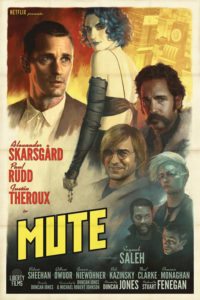Mute, 2018.
Directed by Duncan Jones.
Starring Alexander Skarsgård, Paul Rudd, Justin Theroux, Seyneb Saleh, Noel Clarke, Robert Sheehan, Sam Rockwell and Robert Kazinsky.
SYNOPSIS:
A mute bartender goes up against his city’s gangsters in an effort to find out what happened to his missing partner.
Filmmakers should really stop saying how it took them a decade to get a film made. Nine times out of ten, the final product is disappointing. Case in point, Duncan Jones made the first script for Mute 16 years ago, and the hype has only (understandably) increased since his first two films Moon and Source Code became hits. That his previous film, Warcraft, received poor reviews meant only that a return to sci-fi was a good thing for Duncan, who’s been open about his passion for this brainchild project. Add in a Netflix release and the hype only got bigger, as people all over the world would be able to see it immediately.
The problem with passion projects is that they are more often than not meant for an audience of one. Duncan Jones shows passion for this film, from the obvious (and many) references to Blade Runner and Casablanca to a touching triubute to the director’s father and former nanny, both of whom passed away as he prepared this film. In less than 5 minutes it becomes hard to see why Jones apparently thought it was worth spending so many years on this project. That it came out only months after Dennis Villeneuve’s Blade Runner 2049 met with critical acclaim only hurts this neon-coloured sci-fi noir.
Alexander Skarsgård plays Leo, a mute Amish man who tends at a bar in a neon-light nightclub where he works with his blue-haired girlfriend, Naadirah (Seyneb Saleh) who mysteriously disappears in the beginning of the film. Now Leo must head out into the underworld of 20150s Berlin to find her. Unfortunately, rather than spring into action, Jones begins a slow character study about the world’s most uninteresting man. Leo knocks down doors and intimidates people without using words in pursuit of his love, and so he goes until he conveniently starts putting together all the clues. Not only did Jones made this last for two-plus hours is baffling, that he decided he needed to fill the rest of the runtime with another seemingly unrelated story is plain stupid.
Every few minutes, Jones decides to look away from Leo’s silently boring quest for answers and vengeance by showing us the misadventures of Paul Rudd and Justin Theroux as the ex-military surgeons Cactus Bill and Duck respectively. They are clearly inspired by Hawkeye and Trapper John from M*A*S*H and they are the most entertaining parts of the movie – Rudd seems to be the only person in the cast that’s having fun – with most of their scenes consisting purely on bantering between the characters. Unfortunately, as fun as it is to see them, this part of the plot is overly complicated and non-sensical until the last 20 minutes when everything’s revealed to have been a huge waste of time. Worst of all, their characters are incredibly seedy, with an implied pederasty sub-plot that is brought up and ignored in the span of 5 minutes.
Really, when you have Dominic Monaghan in full geisha makeup wielding a whip and you’re not having fun, you know your film has failed.
According to Duncan Jones, Mute was not originally intended as a sci-fi film, and that explains why some of the most interesting parts of the film feel so out of place. While the cinematography and neon-visuals are certainly cool to look at, the use of futuristic technology feels shoehorned-in. Even the title of the film, referring to the protagonist Leo’s inability to speak, is barely important to the film. Everyone seems to understand him just fine, and Leo is not the type of character that would do much talking anyway.
Is Mute a good film? No. Is it at least a bit entertaining? Sure. Was it worth the 16-year wait? Hell no, but at least Jones finally got it out of his system. Hopefully his fifth film will not be as disappointing or as big a waste of a cast as this one.
Flickering Myth Rating – Film: ★ ★ / Movie: ★ ★
Rafael Motamayor















